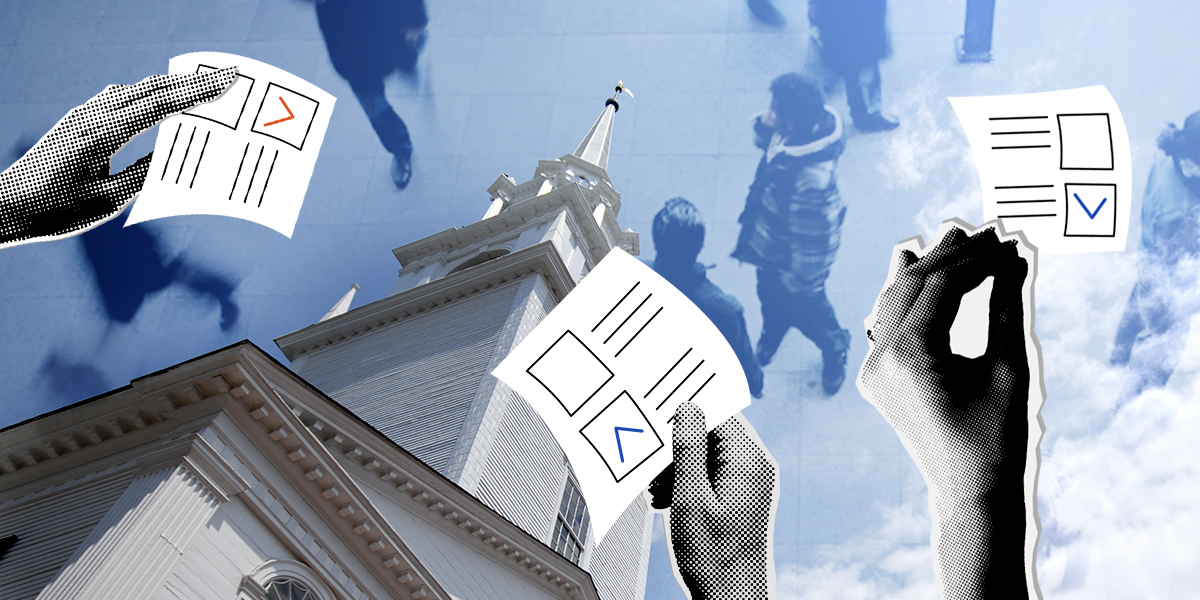By Alex Mace
Growing up in church, it often felt like politics was a taboo subject. As an associate pastor who preached on occasion, I was spoken to when my sermons veered too far on either side of the political spectrum. Political matters have often confounded me as a pastor.
_
“Politics will always impact people of faith.”
_
What is my role as the pastor in explaining politics and engaging the political system? Politics will always impact people of faith — starting in Exodus and carrying with us today. How do the people of God respond? Do our political activities reflect God’s viewpoint and contribute to ending exploitation and injustice, or are we joining those who cause suffering?
Politics (the affairs of the city) is how our collective societies organize themselves to achieve the good of the people. Throughout Scripture, the people of God have organized themselves politically. Let’s look at some examples.
Set Free + Theocracy
The first major political event in Scripture is the Exodus. The centering of the story of Exodus is upon how Israel needs liberation from Pharoah enslaving the Israelites. Pharaoh has taken a specific view of how the affairs of Egypt should be managed. He used the power and might of Egypt to subject and enslave the Israelites to build the empire of Egypt. Moses offers a counterargument: liberation. Moses has heard from God and commanded that His people be set free.
Then the Lord said, “I’ve clearly seen my people oppressed in Egypt. I’ve heard their cry of injustice because of their slave masters. I know about their pain. I’ve come down to rescue them from the Egyptians in order to take them out of that land and bring them to a good and broad land, a land that’s full of milk and honey, a place where the Canaanites, the Hittites, the Amorites, the Perizzites, the Hivites, and the Jebusites all live. Now the Israelites’ cries of injustice have reached me. I’ve seen just how much the Egyptians have oppressed them. So get going. I’m sending you to Pharaoh to bring my people, the Israelites, out of Egypt.” (Exodus 3:7–10 CEB)
At this moment, the best way to describe the political system of Israel is theocracy. The divine leads Israel or empowers one leader to interpret God’s communication to lead the people. The political system of Israel through the Exodus is theocracy.
Tribal Confederation
The second political system that Israel operates under is a tribal confederation. Joshua 14 describes how the land of Canaan is divided, and there is a hierarchy for the division. Preference is for the tribes birthed by Rachel over the tribes of Leah. The tribes of Israel have no unified government. It is tribal leadership that makes decisions, such as calling for defensive forces from the other tribes of Israel.
_
“… they beg for what Moses warned them against.”
_
In Judges, we begin to see a system of unified tribal leadership in the figure of a judge. The judges are the ones who call for the other tribe’s aid, and they provide a system of political leadership as they begin to settle the affairs of the tribes. This portion of Israel’s history is marred by controversy, poor leadership, and a willingness to worship idols.
Raising a national defense gets so tiresome for the tribal leadership that they beg for what Moses warned them against.
Monarchy
The third political system Israel operates under is a monarchy. Divine monarchy and theocracies share a commonality: the divine empowers them. At the beginning of the monarchies in Israel, Saul is chosen and assumed his family will be the kingly family. However, Saul fails to follow God’s command, and David’s family becomes where the divine monarchy rests.
_
“David takes it upon himself to honor God.”
_
The difference between David and Moses is that leadership ends with Moses. His family has not become the new leader of Israel, and God has chosen one person to speak His message. With David, God chooses a family to speak/lead His message to the people. More so than Saul, David takes it upon himself to honor God, building his tent to house the ark and provide continuous worship. Even with all of this development, it comes with some tradeoffs.
Then Samuel explained everything the Lord had said to the people who were asking for a king. “This is how the king will rule over you,” Samuel said: “He will take your sons, and will use them for his chariots and his cavalry and as runners for his chariot. He will use them as his commanders of troops of one thousand and troops of fifty, or to do his plowing and his harvesting, or to make his weapons or parts for his chariots. He will take your daughters to be perfumers, cooks, or bakers. He will take your best fields, vineyards, and olive groves and give them to his servants. He will give one-tenth of your grain and your vineyards to his officials and servants. He will take your male and female servants, along with the best of your cattle and donkeys, and make them do his work. He will take one-tenth of your flocks, and then you yourselves will become his slaves! When that day comes, you will cry out because of the king you chose for yourselves, but on that day the Lord won’t answer you.” (1 Samuel 8:10–18 CEB)
Up to this point in the story of Israel, the political systems make sense. They are like some systems that exist today, they mimic systems they are neighboring, and we can see how there are pitfalls to each of these political systems within the Old Testament. We also see how God uses these systems for His benefit.
Suffering Servant
In exile, things change. A new political system developed through God’s prophets: a Suffering Servant. We see this in Isaiah 53:4–6:
Surely he took up our pain and bore our suffering, yet we considered him punished by God, stricken by him, and afflicted. But he was pierced for our transgressions, he was crushed for our iniquities; the punishment that brought us peace was on him, and by his wounds we are healed. We all, like sheep, have gone astray, each of us has turned to our own way; and the Lord has laid on him the iniquity of us all.
This view from the prophets is different because it describes a king or prince who takes upon the powers of a government or political body. Yet it is unlike any political body we have seen or experienced. The Suffering Servant takes upon tremendous pain for all to be counted righteous. Not so that Israel would be restored as a kingdom, that the borders of Israel would grow, or that a new political dynasty would start, but that God’s people will be made righteous and live in an eternal kingdom.
Jesus is the Suffering Servant. The political structure of a suffering servant is a disappointing political system for those in Israel. Many are anticipating the day when Israel is properly restored and is its own political entity, not under the power of Rome. Jesus receives an unjust ruling and seems to be at the whims of political machinations He cannot control or exert influence over. The Pharisees and Romans seem more potent than Jesus’ political will.
No matter how weak politically Jesus is throughout the story of His ministry, Jesus impacts the affairs of the city.
He embodies a new way of political thinking — one we wrestle with today. God’s will does not need political power because it is accomplished by following the Suffering Servant who gave up power.
We are impacted today by this political idea, which is why pastors feel constrained by politics. Not only do our churches stretch across the political spectrum, but Jesus shows us it isn’t through theocracies, tribal confederations, or monarchies that His will is accomplished. It is through many suffering servants gathering in community caring for the least of these.
How to Engage
The question remains: how do I engage my faith in politics?
The answer is through Jesus. Jesus makes political statements: “give to Caesar what is Caesar’s,” healing on the Sabbath, talking to a woman in Samaria, asking the rich young ruler to give up his wealth, telling Pontius Pilate that He is who He says He is. All these interactions or actions are political or engage the affairs of the city.
_
“We are leaving a gap between the idea of peace and peacemaking.”
_
John Wesley and B.T. Roberts were not silent on political issues in our tradition.
Wesley’s sermon “National Sins and Miseries” speaks directly to issues facing Britain at the start of the American Revolution:
If you had heard men who once feared God and honoured the king, now breathing out the bitterest invectives against him, and just ripe, should any occasion offer, for treason and rebellion; you would not then judge this to be a little evil.
In “First Lessons on Money,” B.T. Roberts speaks directly to how the U.S. government uses money and the impact of monopolies and laws that favor great fortunes:
All laws which specially favor the gaining and the holding of great fortunes should be changed.
If the leaders of our tradition found their voice in speaking to the political issues of their day, then we should find our voice to speak to the political problems of our day. In this season of polarization, the pastorate has often attempted peacemaking and delivered passiveness. While we have attempted to hold two polar opposites together as we follow Christ’s call, we have not discipled people on Christ and His political engagement. We are leaving a gap between the idea of peace and peacemaking. This has often left pastors, myself included, feeling like we can’t engage in issues directly affecting the congregations we are shepherding.
_
“Christ is calling for the will of God to be done on earth as it is in heaven.”
_
How will the people we are pastoring hear the good news of Jesus, not just for them personally but socially and politically?
How can we help clarify our position of radical care for people experiencing poverty without speaking about the political oppression those experiencing poverty often face?
At no point do I think John Wesley or B.T. Roberts tried to create a new theocracy, confederation, or monarchy. In this Western style of democracy, citizens hold equal power regarding election votes and have a voice regarding how they are represented. Simply punching the ticket at election time is not enough for how Christ would call us to engage. Christ is calling for the will of God to be done on earth as it is in heaven.
How the affairs of the city are run impacts how the will of God is accomplished on earth as it is in heaven. There will be no oppression or exploitation of the image of God in the world to come. When the system of politics we live in oppresses and fails to liberate, it requires our voice to speak about the kingdom to come.
No matter the political system we find ourselves in, we take the path of Jesus, the suffering servant who is calling for the end of oppression, for captives to be free, and for prisoners to be released.
_
“We need to know the heart of Jesus to provide a view from Jesus.”
_
Wesley and Roberts spoke on political issues because they were joining the viewpoint of Jesus, the Suffering Servant.
Paul reminds us:
Though he was in the form of God, he did not consider being equal with God something to exploit. But he emptied himself by taking the form of a slave and by becoming like human beings. When he found himself in the form of a human, he humbled himself by becoming obedient to the point of death, even death on a cross. (Philippians 2:6–8 CEB)
Jesus did not seek out the power of God or the political power of Israel, although He was from the Davidic line and had a rightful place to take the crown. He did not use that throne or the throne of God to impose His political will. He did it by impacting the people and fulfilling the role of the suffering servant.
I don’t think we need all our pastors running for city council, senator, governor, or president to speak about the political issues of today. But we need to know the heart of Jesus to provide a view from Jesus. There is no one answer to how we engage in today’s political landscape.
In our two-party system in the United States, we will find ourselves aligned one way, and on other topics, we will be aligned another. There will be no perfect answer for how our congregants should vote this fall. Alleviating poverty and releasing prisoners don’t just happen on a Tuesday in November. We have a persistent call to prophetic action from the Suffering Servant, and those who follow and try to live like the Servant.
+

Alex Mace is an ordained elder in the Central Region Conference and the lead pastor of Northwest Free Methodist Church in Wichita, Kansas. He previously served in Michigan as an associate pastor. Alex and his wife, Mackenzie, have three daughters: Ansley, Kiah, and Hollis.










